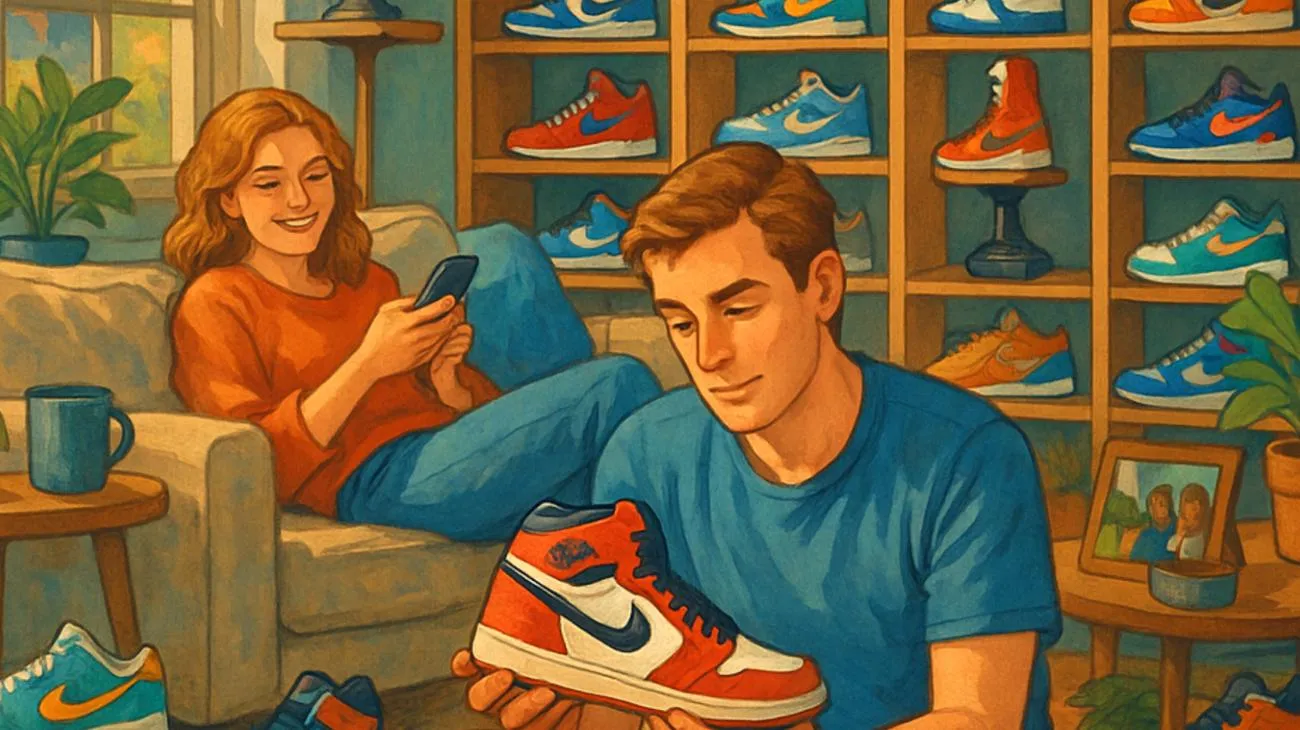Ever caught yourself staring at someone’s Instagram story showcasing their jaw-dropping wall of sneakers and wondered what’s really going on in their brain? Or maybe you’re the one with three closets dedicated to footwear and your friends keep asking if you’re okay? Well, buckle up because the psychology behind shoe obsession is way more fascinating than you think, and it reveals some pretty wild truths about how our minds work.
What starts as innocent shoe shopping can snowball into something that would make Marie Kondo have a panic attack. We’re talking about people who own hundreds of pairs, spend their rent money on limited releases, and treat their sneaker collections like sacred museums. But here’s the kicker – this isn’t just about having nice things to wear. It’s your brain doing some seriously complex psychological gymnastics.
Your Shoes Are Actually Your Identity in Disguise
Here’s something that’ll blow your mind: fashion psychologist Nora Termanini explains that shoes aren’t just accessories – they’re identity construction tools that your brain uses to figure out who you are and show the world different versions of yourself. Think about it for a hot second. When you slip on those beat-up Converse, you’re channeling your creative, rebellious side. Switch to designer heels, and suddenly you’re the boss who runs meetings like a pro.
This isn’t some new-age nonsense either. Consumer psychology research has been screaming this truth for years – we literally use material objects to build our identities and communicate with other humans. Shoes are particularly sneaky at this because they’re both functional and symbolic. You need them to walk, but they also broadcast who you think you are to everyone you meet.
The wild part? Each pair in a collector’s arsenal represents a different personality facet. That vintage Air Jordan collection isn’t just footwear – it’s a carefully curated gallery of different selves that the collector wants to access and project. Your brain basically treats your shoe closet like a costume department for the movie of your life.
The Nostalgia Trap That Hijacks Your Emotions
Ready for some serious psychology talk? Sneaker collecting taps into one of the most powerful emotional forces your brain can experience – nostalgia. And we’re not talking about some gentle, warm feeling. Research shows that nostalgia literally rewires your brain to feel more socially connected, increases your sense of life meaning, and boosts your self-esteem.
That pair of beat-up Vans from high school? Your brain doesn’t see old shoes – it sees a portal back to when you felt invincible and everything seemed possible. Those limited-edition Nikes you saved up for? They’re not just sneakers; they’re childhood dreams made tangible. This is why collectors often keep shoes they never wear – they’re not storing footwear, they’re preserving emotional time machines.
The psychology gets even wilder when you realize that shoe collectors are essentially purchasing feelings and memories. Every acquisition is your brain trying to capture or recreate specific emotional states tied to meaningful periods in your life. It’s like emotional archaeology, but with way better style.
Status Games Your Brain Plays Without Telling You
Let’s get brutally honest about something – a huge chunk of shoe obsession is about status and social positioning, and your brain is the puppet master pulling these strings. The global sneaker market hit a staggering 94.1 billion dollars in 2024 and is projected to exceed 157.9 billion dollars by 2033, which tells you everything you need to know about how serious this status game has become.
Throughout human history, we’ve used clothing and accessories to signal where we stand in the social pecking order. Shoes, being expensive and highly visible, make perfect modern status symbols. When someone drops serious cash on rare sneakers, they’re not just buying footwear – they’re purchasing social capital within specific communities.
The sneaker resale market alone is projected to hit 6 billion dollars in the U.S. by 2025, and this isn’t just about supply and demand. It’s about your brain’s desperate need to belong, to be recognized, and to have other people acknowledge your taste and cultural knowledge. In many communities, especially those influenced by streetwear and hip-hop culture, your shoe game literally determines your social standing.
How FOMO and Scarcity Drive You Completely Insane
Ever wonder why shoe collectors lose their absolute minds over limited releases and exclusive drops? Welcome to the psychological perfect storm that marketers have been exploiting for decades, and your brain falls for it every single time.
Psychologists have documented something called the scarcity principle in groundbreaking work on influence and persuasion. Basically, your brain assigns higher value to anything that’s rare or hard to get. When Nike drops only 500 pairs of something worldwide, your brain doesn’t think rationally – it goes into emergency mode and screams that you absolutely must have those shoes or your life will be incomplete.
Add FOMO – fear of missing out – into this mix, and you’ve got a recipe for completely irrational behavior. The combination of scarcity and time pressure creates genuine anxiety that can only be resolved by acquiring the object. This is why people camp outside stores for days or pay resellers three times the retail price without blinking.
The Social Media Amplification Effect
Social proof makes everything worse. When you see hundreds of other people desperately trying to get the same shoes, it validates your own desire and creates a feedback loop that makes the collecting behavior more intense. Your brain basically goes, “If everyone wants this, it must be incredibly important!” Instagram stories and TikTok hauls fuel this fire, creating virtual communities where shoe acquisition becomes competitive sport.
When Your Shoe Love Becomes a Problem
Here’s where things get real – sometimes shoe collecting crosses the line from harmless hobby into genuinely problematic territory. Research shows that compulsive shoe buying can be linked to anxiety, perfectionist tendencies, and attempts to fill emotional voids through material accumulation.
While there’s no official diagnosis called “shoe collecting disorder,” the behavior can share characteristics with Compulsive Buying Disorder, which is very much a real thing. This happens when your brain starts using shopping and acquiring as a primary way to cope with stress, depression, or feelings of inadequacy.
Warning signs that your shoe obsession might be problematic include buying despite financial strain, feeling completely unable to control purchasing urges, experiencing genuine anxiety when you can’t buy shoes you want, and letting shoe purchases mess with your relationships or responsibilities. The temporary high from buying something new can become genuinely addictive, leading to financial disasters and emotional distress.
The Perfectionist Brain and Complete Collections
Some shoe collectors exhibit perfectionist tendencies that manifest in truly obsessive ways. We’re talking about people who need every single colorway of a particular model, who arrange their collections with military precision, or who feel genuine distress if they can’t complete a specific set.
Research shows that perfectionism can be both helpful and harmful. On the positive side, it can drive collectors to become genuine experts, develop incredible organizational skills, and find real satisfaction in creating complete collections. On the flip side, it can create chronic anxiety and compulsive behaviors when the “perfect” collection remains forever out of reach.
Your perfectionist brain can turn shoe collecting into a never-ending quest that brings more stress than joy. Understanding this distinction is crucial for maintaining a healthy relationship with collecting, especially when every new release seems to demand a spot in your carefully curated lineup.
Finding Your Tribe Through Footwear
One of the most psychologically healthy aspects of shoe collecting is the community and sense of belonging it creates. Sneaker communities, both online and in real life, offer collectors a space to share their passion with people who actually understand why spending 500 dollars on shoes makes perfect sense.
Research consistently shows that feeling connected to others and being part of a community are fundamental human needs directly linked to mental health and wellbeing. For many collectors, shoe communities provide social connections, shared experiences, and a sense of identity that might be difficult to find elsewhere.
- Trading knowledge about rare releases and authentication tips
- Sharing restoration techniques for vintage pairs
- Connecting over shared cultural references and style inspirations
- Providing emotional support during expensive purchase decisions
These communities also function as learning spaces where people develop genuine expertise. This kind of social interaction boosts self-esteem and provides a sense of mastery that extends beyond just owning cool shoes.
Control, Comfort, and Emotional Band-Aids
Some psychologists suggest that collecting behaviors serve as a form of emotional regulation and control. In a world where everything feels chaotic and unpredictable, building and organizing a shoe collection can provide a sense of order and control that your brain desperately craves.
For people dealing with anxiety or stress, the ritual of caring for their collection, researching new releases, or organizing their shoes can serve as a form of mindfulness and stress relief. The predictability and control involved in collecting can be genuinely psychologically soothing, like meditation but with way cooler props.
However, the key is making sure that collecting serves as one of many coping strategies rather than your brain’s primary way of dealing with emotional challenges. When shoe collecting becomes your only source of comfort or control, that’s when healthy hobby territory starts shifting toward problematic behavior.
The Investment Mindset and Financial Psychology
Modern shoe collecting has developed a fascinating investment mentality that adds another psychological layer to the obsession. Collectors often justify expensive purchases by viewing their shoes as appreciating assets rather than mere accessories, and sometimes they’re absolutely right about the financial potential.
Certain vintage Air Jordans have appreciated faster than stock market indexes, and rare collaborations can multiply in value within months. This creates a psychological safety net that makes spending easier to rationalize. Your brain loves this because it transforms what might feel like frivolous spending into “smart financial planning.”
- Limited edition releases that sell out instantly often double in resale value
- Celebrity collaborations create instant collectible status
- Deadstock vintage pairs become increasingly valuable over time
- Cultural moments can skyrocket specific models into investment territory
The investment angle also feeds into the collector’s expertise and research habits, making the hobby feel more legitimate and intellectually engaging than simple shopping.
The Wild Truth About Shoe Psychology
The psychology behind shoe obsession is absolutely mind-blowing when you break it down. We’re talking about identity construction, social signaling, emotional regulation, community building, and consumer behavior all wrapped up in objects you wear on your feet. For most people, shoe collecting represents a healthy expression of personal interests and cultural participation.
The secret to keeping your relationship with shoe collecting healthy lies in self-awareness and balance. Understanding the psychological forces driving your behavior helps you make more intentional choices about your hobby and recognize when it might be serving needs that could be met in other ways.
Rather than treating shoe collecting like some kind of psychological disorder, it’s way more helpful to view it as a fascinating example of how humans use material objects to meet deep psychological needs, express identity, and connect with other people. When approached mindfully, shoe collecting can be a genuine source of joy, community, and self-expression that enriches your life instead of complicating it.
The next time you see someone’s incredible shoe collection, remember that you’re not just looking at expensive footwear. You’re witnessing a complex psychological landscape of identity, memory, social connection, and human creativity expressed through carefully chosen objects that literally support someone as they move through the world. And honestly? That’s pretty amazing when you think about it.
Table of Contents

